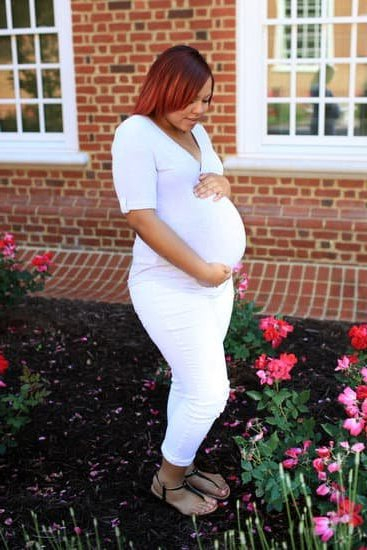How does your lower stomach feel in early pregnancy? This question is a common concern for women who suspect they may be pregnant. Understanding the early signs of pregnancy can help navigate the changes happening in your body. During the first few weeks of pregnancy, many women experience various sensations in their lower stomach as their body adapts to the growing fetus.
The lower stomach, also known as the pelvic area, undergoes significant changes during early pregnancy. As the fertilized egg implants itself into the uterus, you may feel some discomfort or unusual sensations in this region. These feelings can range from subtle twinges to mild cramping, signaling that your body is preparing for the journey ahead.
It’s important to differentiate between normal sensations and potential warning signs during early pregnancy. While some cramping and discomfort are typical as your uterus expands and ligaments stretch, persistent or severe pain should not be ignored. Knowing when to seek medical advice for lower stomach pain is crucial for ensuring a healthy pregnancy and addressing any concerns promptly.
The Anatomy of the Lower Stomach
During the first few weeks of pregnancy, many women may experience various sensations in their lower stomach region. Understanding the anatomy of the lower stomach can help expectant mothers navigate this period with more knowledge and confidence. Here are some key points to keep in mind about what to expect during early pregnancy:
- The uterus: One of the primary changes that occur during early pregnancy is the expansion and growth of the uterus. As the fertilized egg implants itself in the uterine lining, the uterus begins to enlarge to accommodate the developing fetus.
- Hormonal changes: Hormones play a crucial role in supporting a healthy pregnancy. In early pregnancy, hormonal fluctuations can lead to increased blood flow to the pelvic area, which may contribute to sensations like mild cramping or bloating in the lower stomach.
- The cervix: The cervix, located at the lower end of the uterus, undergoes changes during early pregnancy. It may become softer, higher, and more closed as it prepares for the upcoming months of gestation.
Understanding these physiological changes can help women better interpret how their lower stomach feels in early pregnancy. While each woman’s experience may vary, being aware of these normal developments can provide reassurance and support during this exciting time.
- It is essential to remember that every woman’s body is different, and sensations in the lower stomach can vary from person to person. Some women may describe feelings of fullness or heaviness, while others may experience occasional twinges or pulling sensations.
- Listening to your body and paying attention to any persistent or severe discomfort is crucial during early pregnancy. If you experience sharp or prolonged pain in your lower stomach, along with bleeding or other concerning symptoms, it is important to seek medical advice promptly.
- In addition to physical symptoms, emotional support is also vital during early pregnancy. Talking openly with healthcare providers, loved ones, or joining support groups can provide comfort and guidance as you navigate this transformative journey into motherhood.
Common Sensations in the Lower Stomach During Early Pregnancy
During the early stages of pregnancy, many women experience a variety of sensations in their lower stomach that can be attributed to the changes happening in their bodies. One common sensation that is frequently reported is a feeling of bloating or fullness in the lower abdomen. This is often due to hormonal changes that cause the muscles in the digestive system to relax, leading to slower digestion and an increased amount of gas.
Another sensation that many women notice in their lower stomach during early pregnancy is mild cramping or twinges. These cramps can feel similar to menstrual cramps, but are usually milder and shorter in duration. This type of cramping is typically considered normal as the uterus begins to expand and make room for the growing fetus. However, if the pain becomes severe or is accompanied by bleeding, it is important to contact your healthcare provider immediately.
Some women may also describe a pulling or stretching sensation in their lower stomach during early pregnancy. This can be attributed to the ligaments supporting the uterus stretching and adjusting to accommodate the developing baby.
While this sensation can be uncomfortable at times, it is generally considered a normal part of the pregnancy process. Remember that every woman’s experience is unique, so it’s essential to listen to your body and seek medical advice if you have any concerns about how your lower stomach feels during early pregnancy.
| Common Sensations | Description |
|---|---|
| Bloating or Fullness | Caused by hormonal changes affecting digestion |
| Mild Cramping | Resulting from uterus expansion and fetal development |
| Pulling/Stretching Sensation | Ligament adjustments for growing baby accommodation |
Cramping vs Other Feelings
Cramping in the lower stomach during early pregnancy is a common symptom that many women experience. It can feel similar to menstrual cramps, with mild to moderate pain and discomfort. The uterus begins to expand and make room for the growing fetus, which can cause these cramping sensations. This type of cramping is usually considered normal and is often one of the earliest signs of pregnancy.
In addition to cramping, other feelings in the lower stomach during early pregnancy may include bloating, gas, and occasional twinges or pulling sensations. The body undergoes significant changes during this time, such as hormonal shifts and increased blood flow to support the developing embryo. These changes can lead to various sensations in the lower abdomen as the body adapts to pregnancy.
It is important for pregnant individuals to pay attention to how their lower stomach feels in early pregnancy and be able to differentiate between normal discomfort and concerning symptoms. While some cramping and mild discomfort are expected as part of the natural process of pregnancy, severe pain, persistent cramping, or spotting may signal a potential issue that requires medical attention.
Always trust your instincts and consult with a healthcare provider if you have any doubts or concerns about how your lower stomach feels during early pregnancy.
| Common Sensations | Interpretation |
|---|---|
| Mild to moderate cramping | Normal sign of uterus expanding |
| Bloating, gas | Body adjusting to hormonal changes |
| Twinges or pulling sensations | Natural response to embryo development |
Tips for Alleviating Discomfort in the Lower Stomach During Early Pregnancy
During the early stages of pregnancy, many women experience a range of sensations in their lower stomach area. These discomforts can vary from mild twinges to sharp pains, and it is important to find ways to alleviate these feelings for a more comfortable pregnancy journey. Here are some tips that may help in reducing discomfort in your lower stomach during early pregnancy:
- Stay hydrated: Drinking plenty of water can help ease bloating and constipation, which are common symptoms that contribute to lower stomach discomfort during early pregnancy.
- Rest and relax: Taking time to rest and unwind can help reduce stress and tension in the abdominal area, easing any discomfort you may be feeling.
- Gentle exercise: Engaging in light exercises such as walking or prenatal yoga can help improve circulation and digestion, which may alleviate lower stomach discomfort.
It is also essential to maintain a healthy diet rich in fiber and nutrients to support your body during this time. Avoiding foods that may exacerbate bloating or gas can also help reduce discomfort in your lower stomach area. Additionally, wearing loose-fitting clothing and investing in a supportive belly band can provide relief from any pressure or strain on your lower abdomen.
Remember that every woman’s experience with pregnancy is unique, so it is important to listen to your body and seek guidance from your healthcare provider if you have any concerns about how your lower stomach feels during early pregnancy. By taking proactive steps to alleviate discomfort and prioritize your well-being, you can enhance your overall comfort and enjoyment throughout this special time.
When to Seek Medical Advice for Lower Stomach Pain in Early Pregnancy
Signs to Look Out For
During the first trimester of pregnancy, it is not uncommon for women to experience some discomfort in their lower stomach. However, there are certain signs that should not be ignored and may indicate a more serious issue.
If you experience severe and persistent abdominal pain, especially if it is accompanied by bleeding or spotting, it is important to seek medical advice immediately. These symptoms could be indicative of an ectopic pregnancy or a miscarriage, both of which require immediate medical attention.
Unusual Symptoms
Additionally, if you notice any unusual symptoms such as severe dizziness, fainting, high fever, or pain during urination along with lower stomach pain, do not hesitate to contact your healthcare provider. These could be signs of an infection or other complications that need to be addressed promptly. It is always better to err on the side of caution when it comes to the health and well-being of both you and your baby.
Consulting Your Healthcare Provider
If you have any concerns about how your lower stomach feels in early pregnancy, do not hesitate to reach out to your obstetrician or midwife. They are equipped to assess your symptoms, provide guidance on what may be normal versus concerning, and offer necessary medical intervention if needed. Remember that seeking professional medical advice is crucial in ensuring a healthy pregnancy and addressing any issues that may arise early on.
Personal Experiences
During the early stages of pregnancy, many women experience a variety of sensations in their lower stomach that can sometimes be confusing or concerning. One common sensation reported by women is a mild cramping or pulling feeling in the lower abdomen. This can be attributed to the stretching and expanding of the uterus as it accommodates the growing embryo. Some women have described this sensation as similar to menstrual cramps, but milder and more intermittent.
Aside from cramping, some women may also feel a bloating or fullness in their lower stomach during early pregnancy. This is often due to hormonal changes that affect digestion and cause increased gas production.
The expanding uterus can also put pressure on the intestines, leading to feelings of discomfort and bloating in the abdominal area. It’s important to note that every woman’s experience with early pregnancy symptoms can vary, so not all may feel the same sensations in their lower stomach.
For some women, they may not necessarily feel anything different in their lower stomach during early pregnancy. It’s essential to remember that every woman and every pregnancy is unique, so experiencing symptoms differently does not necessarily indicate a problem.
However, it’s crucial to pay attention to any severe or persistent pain in the lower abdomen, as this could potentially be a sign of an underlying issue. If you are unsure about how your lower stomach feels during early pregnancy or if you have any concerns about your symptoms, it’s always best to consult with your healthcare provider for personalized advice and guidance.
Conclusion
In conclusion, it is crucial for women to pay close attention to their bodies and the signals that they may be experiencing during the early stages of pregnancy. Understanding how your lower stomach feels in early pregnancy can provide valuable insight into the changes taking place within your body. While some sensations may be normal, others might warrant medical attention.
Pregnancy is a unique journey for each woman, and what one person experiences may differ from another. By learning to differentiate between cramping and other feelings in the lower stomach, expectant mothers can better identify when something may be amiss and take appropriate action. Seeking support from healthcare providers, friends, and family members can offer reassurance and guidance during this time of uncertainty.
Ultimately, the well-being of both the mother and the baby is paramount. If you are experiencing any concerning symptoms or persistent discomfort in your lower stomach during early pregnancy, do not hesitate to reach out to your healthcare provider for advice. Remember, every pregnancy is different, so trust your instincts, listen to your body, and seek support when needed. This marks the beginning of an incredible journey towards motherhood – embrace it with care and awareness.
Frequently Asked Questions
How Does Lower Abdomen Feel in Early Pregnancy?
In early pregnancy, the lower abdomen can feel slightly bloated or tender due to hormonal changes and the uterus expanding to make room for the growing baby. Some women may also experience mild cramping as the body adjusts to pregnancy.
Does the Lower Part of Your Stomach Get Hard in Early Pregnancy?
Yes, in some cases, the lower part of the stomach can feel hard in early pregnancy. This hardness is often attributed to the muscles of the uterus tightening or contractions known as Braxton Hicks contractions. However, it’s essential to consult with a healthcare provider if this sensation is persistent or accompanied by pain.
How Can You Tell if Your Pregnant Belly Is Early?
An early pregnant belly may show subtle signs such as bloating, slight rounding of the lower abdomen, or a feeling of fullness. Some women may notice their clothes fitting more snugly around their waistline. However, each woman’s body is different, so not all signs will be noticeable externally in the early stages of pregnancy for every woman.

Welcome to my fertility blog. This is a space where I will be sharing my experiences as I navigate through the world of fertility treatments, as well as provide information and resources about fertility and pregnancy.





